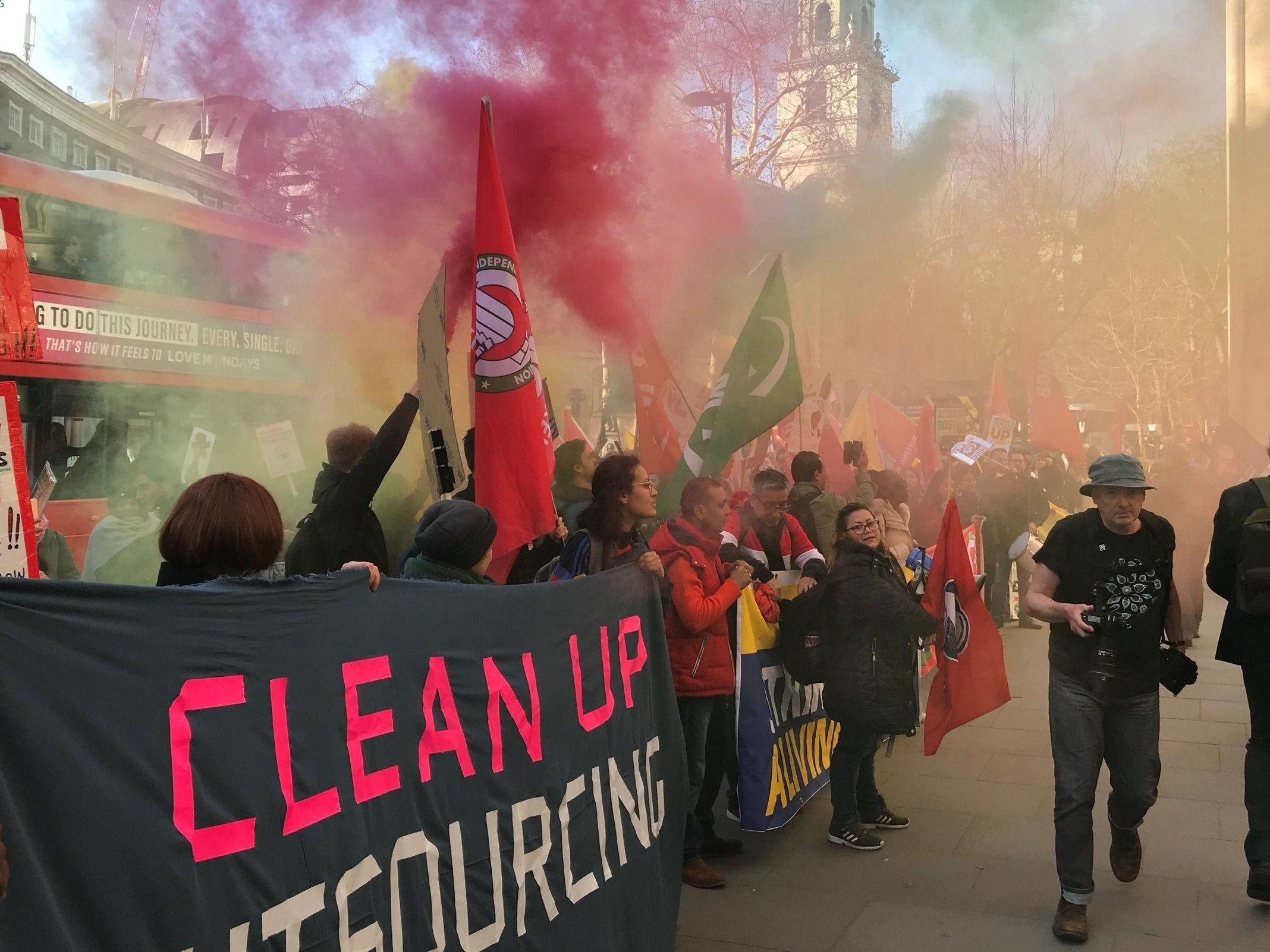Outsourcing is a scourge on our society – but workers are now fighting back
Outsourced workers in two government departments earn no more than the minimum wage. It's time for ministers to listen to the calls of those on strike and bring them back inhouse


Your support helps us to tell the story
From reproductive rights to climate change to Big Tech, The Independent is on the ground when the story is developing. Whether it's investigating the financials of Elon Musk's pro-Trump PAC or producing our latest documentary, 'The A Word', which shines a light on the American women fighting for reproductive rights, we know how important it is to parse out the facts from the messaging.
At such a critical moment in US history, we need reporters on the ground. Your donation allows us to keep sending journalists to speak to both sides of the story.
The Independent is trusted by Americans across the entire political spectrum. And unlike many other quality news outlets, we choose not to lock Americans out of our reporting and analysis with paywalls. We believe quality journalism should be available to everyone, paid for by those who can afford it.
Your support makes all the difference.The ever changing nature of our labour market has dramatically altered the relationship between employee and employer.
The old model of employment no longer exists, workers are now often exploited through tiers of contractors, each one taking a slice of the profit leaving outsourced workers with the bare minimum.
Outsourcing has fast become the norm in both the public and private sector which offload departments like admin, accounting or HR to external companies in order to cut down on costs.
These savings, however, inevitably fall onto workers, whose pay, terms and conditions are squeezed. Contracting services out has always been associated with growing low-pay and increased workplace poverty.
While EU law enshrines many fundamental rights which benefit low-paid outsourced workers, such as paid holidays and protection against discrimination, there is still a great deal of uncertainty for workers as to whether their rights will be protected after we leave the EU. This is especially important to workers who find themselves on precarious outsourced contracts.
The government may express delight over rising employment figures but in reality all is not what it seems. Of course any increase in employment is to be welcomed, however, it must be secure, stable and well paid work that allows people to have a decent standard of living. Unfortunately that is not the case: there are now four million people in insecure work and much of which is poorly paid and lacking a set number of hours.
A large proportion of outsourced workers – of which there are 3.3m in the UK according to the TUC – are in insecure, low paid work. Outsourced workers often fail to receive the same benefits as inhouse employees, creating a divide within the workforce.
And it is often workers at the bottom, not at the top who are outsourced. The cleaners, security guards, porters, receptionists, post room staff and caterers who all receive poverty pay and are denied their full legal rights. Nowhere is this truer than at the Department for Business, Energy and Industrial Strategy (BEIS), the department responsible for workers’ rights.
Many of the outsourced workers at both BEIS and the Ministry of Justice, earn no more than the minimum wage, which is well below the £10.55 that the Living Wage Foundation calculates is necessary for an adequate life in an expensive city such as London.
The unions have strongly argued that the contractors should pay the London Living Wage and that BEIS should be putting pressure on the contractors to do so.
How are we meant to trust the government to protect workers around the country after Brexit and ensure that we receive decent pay if they cannot even protect workers in their own departments?
Outsourced workers at the department recently voted for their second day of strike action, and I was proud to stand with them and their unions in solidarity at the picket line. However, despite this the business secretary still refuses to budge. He has refused again to meet with the union to discuss their concerns and has refused to bring an end to the culture of outsourcing that has exploded under the Tories.
Another action by outsourced workers who are fighting back can be found in the high court, where yesterday a judicial review began, brought by the IWGB union, arguing for collective bargaining rights for outsourced workers at the University of London. The union argues that as the University of London essentially determines the outsourced workers’ terms and conditions, that the European Convention on Human Rights requires outsourced workers to have collective barging rights directly with the University of London, and not just the contractor.
This is already the case in the US where the joint employer concept is fully enshrined into law. Collective bargaining is a fundamental element of workers’ rights and it is shameful that outsourced workers in the UK are having to fight tooth and nail for their basic rights.
The business secretary intervened in the case, arguing against the workers and the unions and for the law to remain as it is, helping deny outsourced workers their collective bargaining rights.
It seems as though the dogma of outsourcing will never end. However, there is hope for the future. Workers have had enough and are fighting back. If successful this case could affect millions of workers and is testament to the hard work of the workers and the union for getting the case to the high court and demonstrating the power of collective action.
Labour will bring an end to the outsourcing racket that has exploded under the Tories’ watch. We will change the rules to make the public sector the default choice for providing government services, radically reducing the use of rip off contracts within the public sector.
We will also carry out a revolution of rights in the workplace, improving the lives of millions of precarious, low paid workers by ensuring that all workers are paid a real living wage and have their full legal rights from day one of employment.
Rebecca Long-Bailey is the shadow business secretary
Join our commenting forum
Join thought-provoking conversations, follow other Independent readers and see their replies
Comments